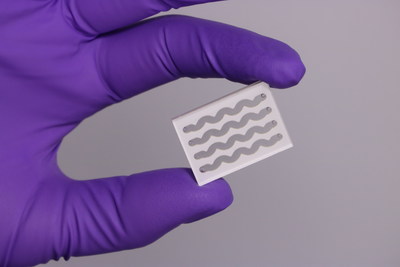Redbud Labs announced today new results that show the speed of its microfluidic sample preparation chip, STR™ (“sorter”).
|
RESEARCH TRIANGLE PARK, N.C., Aug. 8, 2019 /PRNewswire/ -- Redbud Labs announced today new results that show the speed of its microfluidic sample preparation chip, STR™ ("sorter"). STR was compared against the gold standard method, magnetic beads, in affinity capture of 1 micron targets. In the study, a one-minute STR protocol captured three times as many targets as a 30-minute on-cartridge magnetic bead assay, showing STR was simultaneously 30x faster and 3x more efficient.
The study highlights the sample prep challenges facing developers of sample-to-answer tests. Redbud's scientists tested magnetic beads in three configurations. The first was incubation in a microfuge tube on a rotator, mimicking the standard laboratory method. The other two, were incubation in a microfluidic chamber, simulating cartridge-based methods. In one case, the beads and sample were mixed off-chip then added to the chamber. In the other, the beads were dried in the chamber and rehydrated at runtime. In both of the on-cartridge tests, the performance of magnetic beads dropped by more than 80% compared with the rotator conditions. By comparison, Redbud's STR chip was about 3x faster than the rotator method. "Anyone developing a sample-to-answer test needs to grapple with just how poorly magnetic beads can perform on-cartridge," said Richard Spero, CEO of Redbud Labs. "Assay developers working with magnetic beads at the bench should be prepared to see their performance drop by almost an order of magnitude when they move to a cartridge. This is the danger of using tools that aren't cartridge-ready. We are thrilled to see that STR not only recovers the lost performance, but even outperforms the benchtop bead-based protocol." STR's fast performance is enabled by Redbud Posts, magnetically driven microposts that induce chaotic advection to accelerate target capture. This technology makes STR compatible with a wide range of biospecimens, including blood, urine, and saliva. STR is also compatible with a wide range of target sizes, from tens of microns to tens of nanometers. "This study reveals the power of Redbud Posts," said Dr. Jay Fisher, Vice President of R&D at Redbud Labs. "First, STR's microstructure increases the surface area and ensures an even distribution of binding sites throughout the chamber. Even our passive STR chip was 30x faster than the on-cartridge bead methods. Second, we drive the posts with magnetic fields, adding another 3x to the capture efficiency. The combination enables performance that exceeds even the optimal, laboratory-based magnetic bead methods. We're excited to see how our customers will use this technology to addresses the sample prep bottleneck in so many applications, including infectious disease, liquid biopsy, and other multiplexed molecular analyses." The full application note was released today at redbudlabs.com/str/. ABOUT REDBUD Redbud Labs®, headquartered in Research Triangle Park, North Carolina, manufacturers cartridge-ready™ microfluidic components for life science industry. MXR™, the world's fastest, most adaptable microfluidic mixing chip, and STR™, the first cartridge-ready sample prep solution, address some of the industry's toughest microscale fluidic challenges. Redbud technologies have broad application across a variety of segments including basic research, drug discovery and development, biomanufacturing, point-of-care molecular diagnostics, sequencing, and applied markets. Industry partners seek Redbud's proprietary Redbud Post™ technology, component design expertise and deep scientific know-how to advance their own next generation products. Rebudlabs.com For further information contact: Kathryn Lawrence
SOURCE Redbud Labs |






